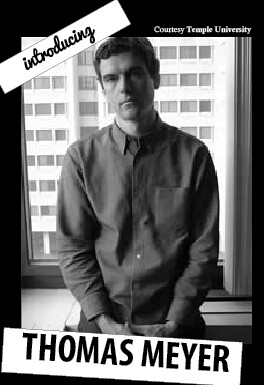 Thomas Meyer, assistant professor in the philosophy department, is a self-described “math person.” It’s from math he said he derived his curiosity for philosophy.
Thomas Meyer, assistant professor in the philosophy department, is a self-described “math person.” It’s from math he said he derived his curiosity for philosophy.
After obtaining his bachelor’s degree from Harvard University and a Ph.D from the University of Pennsylvania, Meyer now seeks to challenge the idea that philosophy brought math into the world. More naturally, he now seeks to figure out what mathematics allows one to do. Meyer’s current research focuses on the philosophy of culture.
He said he is most interested in understanding what it means to be human, and the challenges that humanity seems to constantly face. Meyer said he strongly believes if one has a concern for human life and the meaning of human life, philosophy is a place for people to begin searching for answers.
The Temple News sat down with Meyer to discuss his in-progress book, “Immanence,” and what the future holds for current philosophy students.
The Temple News: How do you define philosophy?
Thomas Meyer: I like to compare it with other things, there are some questions where we would like to know the answer. Philosophy seeks to make sense of what we cannot answer through other means. You are learning to see more of what is taking place.
TTN: What words of advice do you give to your students?
TM: As you grow older you may not become smarter, but you will become more intelligent. I hope that my students are about to walk out into the world with the realization that to think for yourself is art. To develop this stream of thought into a condition, which they can contribute to the humanity, is what I hope my students are ultimately about to understand.
TTN: Tell us about the book you are working on, “Immanence.”
TM: The project relates to how a group of philosophers from the recent past thought about our humanity and the fall of human life. The project is an attempt to synthesize the work of a few great people in the field. I’ve been working on the book for about a year and a half.
TTN: How does the study of philosophy translate into jobs?
TM: People will be hired for their training but skilled to think about what they do. Philosophy translates into jobs for people who want to study law. There is an element in being about to solve problems on one’s own. These are all important skills that translate into job skills.
TTN: When students graduate, what do you hope they would have gained from their college experiences?
TM: I hope that they understand there is a difference between getting an education and simply being entertained. I have seen what education looks like when it does not educate. The 20s are so important, you won’t get less smart as you get older, but you will see less things. There is an aspiration to do something beyond oneself, an eagerness to be useful and relevant to life.
TTN: What do you enjoy doing in your free time?
TM: I am an avid hiker, I’ve gone all over the world, and I plan to continue doing so. I am pretty busy writing these days, I belong to a food co-op, and I am an avid Go player.
I still like this room. I plan to stay here at Temple for a while.
Priscilla Ward can be reached at priscilla.ward@temple.edu.


Be the first to comment